Personally identifiable information (PII), protected health information (PHI), credit card numbers, bank account numbers, and more — many businesses collect this data for a number of reasons.
Regardless of what type of sensitive data your organization collects and why, it’s vital to have security measures in place to keep that data from falling into the wrong hands.
So what’s the best way to collect sensitive information — and keep it safe?
The answer depends on a variety of factors, including the software you use and the regulations you have to follow. But one thing is for certain: If your business doesn’t collect sensitive information securely, there can be negative consequences for the organization as well as employees, customers, and other stakeholders.
We’re here to help you avoid those consequences. In this article, we’ll explain the most essential concepts related to secure data collection: what sensitive data is, common data protection laws and standards, and various data protection methods. We’ll also identify the criteria you need to consider when selecting data-collection software.
Sensitive data: Its meaning and risks
The term “sensitive data” may apply to different things depending on the industry, privacy and security regulations, and country, but the idea behind it is the same everywhere:
Sensitive data is data that can cause harm, discrimination, embarrassment, or other negative repercussions if it is released without authorization.
Examples of sensitive data include
- Personally identifiable information (PII): name, contact information, social security numbers, etc.
- Personal information (PI): location, photographs, sexual orientation, racial or ethnic background, criminal records, etc.
- Protected health information (PHI): biometric identifiers, health plan numbers, medical record numbers, etc.
- Nonpublic personal information (NPI): bank account and credit card numbers, credit card purchases, social security numbers, etc.
- Sensitive personal information (SPI): account login information, financial information, driver’s license numbers, etc.
- Material nonpublic information (MNPI): corporate information, earnings reports, legal rulings, etc.
An organization that collects sensitive data must be aware of the risks it can pose for the company. If sensitive data is lost, stolen, accessed without authorization, hacked, or otherwise misused, it can lead to a number of issues such as legal action, loss of reputation, and fines.
The people to whom the data belongs may also have to contend with issues like identity theft, financial losses, and access issues with their own accounts.
In some rare cases, collecting sensitive data without the necessary safeguards in place can even lead to national security risks.
Common data protection laws and standards
“There are numerous data protection laws worldwide, each tailored to the specific needs and concerns of their jurisdictions,” says Ankit Prakash, founder of Sprout24, a software intelligence solution.
“These laws mandate strict guidelines on data collection, storage, and dissemination, ensuring that organizations prioritize user privacy.”
Some common laws and standards organizations may encounter include
- Health Insurance Portability and Accountability Act (HIPAA): This law applies to the United States and covers 18 different types of protected health information (PHI).
- General Data Protection Regulation (GDPR): This EU regulation requires that organizations acquire consent before collecting personal data. Note that the GDPR applies if you have users/customers in the EU, even if your organization is located elsewhere.
- Strong Customer Authentication (SCA): This EU standard governs digital payment information.
- The California Consumer Privacy Act (CCPA): This state law dictates what businesses can (and can’t) do with consumer data. Like the GDPR, the CCPA applies if you have users/customers in California, even if your organization is located elsewhere.
- The Gramm-Leach-Bliley Act (GLBA): This United States law requires financial organizations to communicate how they keep consumers’ financial data secure.
- Personal Information Protection and Electronic Documents Act (PIPEDA): This Canadian law oversees how businesses use consumer data.
This is just a small selection of data privacy and security laws; there are hundreds of them around the world. Organizations need to be aware of which privacy and data security laws apply to them in the areas they do business to ensure they adhere to the regulations. Not doing so can result in fines, loss of business licenses, and many more serious repercussions.
Data-collection tools and important selection criteria
Organizations collect sensitive data in many different ways — in person, over the phone, through a website, via email, or even over social media.
There are several types of tools organizations can use for data gathering, including customer relationship management systems, content management systems, and intranets.
Online form software tools, such as Jotform, Google Forms, Microsoft Forms, and SurveyMonkey, are also popular. Many of these form solutions are built with multiple layers of security that help prevent sensitive data breaches and alert organizations about vulnerabilities.
When evaluating data-collection tools, it’s vital to look at the different ways they protect sensitive data, such as
- SSL encryption
- PCI DSS certification
- Secure data storage
- Adherence to compliance regulations such as GDPR and HIPAA
- Spam protection
- Data backups
- Business continuity plans
- Disaster recovery plans
Without multiple layers of security and different types of protection, sensitive data may be at risk as soon as an organization collects it.
Note that it’s also important to look at security from both a prevention standpoint and a response standpoint. While security features help stop security threats, there are times when bad actors can still access sensitive information.
For that reason, find out about the action plans the software vendor has in place if a data breach occurs. The vendor you use to collect data should be able to quickly respond to such issues, contain the breach immediately, notify those whose data has been affected, and rectify the issue so it can’t happen again.
“When choosing tools for collecting sensitive data, organizations must prioritize security,” says Prakash. “It’s essential to opt for platforms that offer end-to-end encryption, robust access controls, and regular security audits. Additionally, the tool should be compliant with relevant data protection regulations. User-friendliness is another factor; if a tool is too complicated, it can lead to errors, which in turn can compromise data.
“Last, organizations should consider the tool’s scalability and integration capabilities to ensure it can grow with the company’s needs and seamlessly fit into the existing tech ecosystem.”
Effective data-protection methods for sensitive information
No single tool or feature can cover every type of security threat. Therefore, the best way to collect sensitive information is by using a combination of tools, policies, training, and organizational standards.
“There are several tools and methods for collecting sensitive data,” says Prakash. “Encrypted forms, secure databases, and tokenization are common techniques. Tools like end-to-end encrypted survey platforms or secure customer relationship management (CRM) systems are often employed by organizations to ensure that the data remains confidential and is only accessible to authorized personnel.”
To protect sensitive data during collection, use, and storage, be sure to employ these data-protection methods:
- Multiple layers of encryption: Look for software that encrypts data at rest and while in transit to ensure it’s always protected.
- Two-factor authentication (2FA): 2FA reduces the chances of unauthorized access to accounts.
- Strong network security: A well-protected network can minimize issues such as viruses, spam, phishing, and more.
- Security audits: Security is never complete. Work with platforms that constantly measure their security protections and work to improve them.
- Employee training: It’s vital to teach employees about how to securely collect, use, and store sensitive data.
- Collection rules and protocols: Only collect sensitive data that’s required to conduct business. Destroy sensitive data once you no longer need it.
- Data storage inventory: Know where sensitive data is stored in your organization, who has access to it, and how it’s maintained. This can help prevent data breaches.
- Access restrictions: Limit access to sensitive data only to necessary personnel, and remove access when it’s no longer needed. Keep automated logs so you have a record of who has accessed the data and when.
Jotform: An ideal solution for collecting sensitive data
If you’re looking for an easy-to-use data-collection tool with enterprise-level security measures, take a look at Jotform.
This online form builder makes it simple to create robust forms and collect important data.
Data security is paramount at Jotform, which is why organizations in many industries that regularly deal with sensitive information, such as healthcare, government, financial services, and e-commerce, trust it. Some of Jotform’s security features include
- 256-bit SSL
- High-grade encryption
- Secure data servers
- PCI DSS Service Provider Level 1 certification
- GDPR compliance
- Features that help with HIPAA compliance
- Spam protection
- General legal compliance
- Privacy and access settings
- Data backup plans
- Security audits
- Network security
While it has many security features, Jotform also offers multiple ways to collect sensitive information.
You can create custom forms, surveys, polls, questionnaires, and quizzes using Jotform’s thousands of templates and tailor them to your needs with the drag-and-drop Form Builder.
You can then manage the sensitive data you collect in Jotform Tables, a spreadsheet-powered database, and even create visual reports from the information using Jotform Report Builder.
If you’re looking for a solution that can help you gather, store, and manage all your sensitive data, choose Jotform and rest easy — it’s one of the best ways to collect sensitive information for any organization.
Photo by Sora Shimazaki


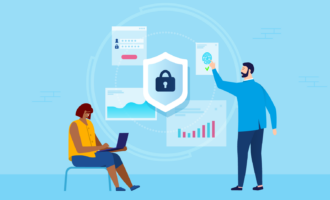

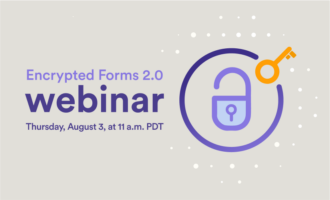
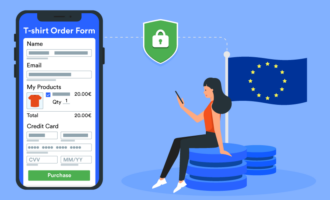


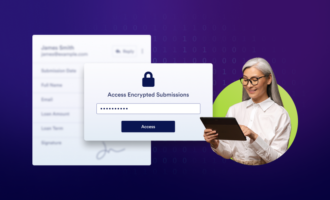
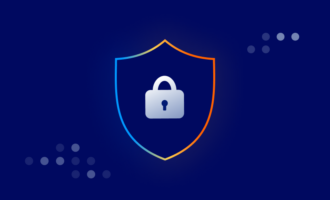

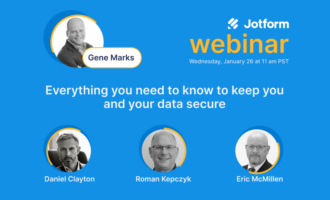
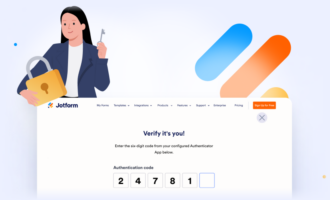

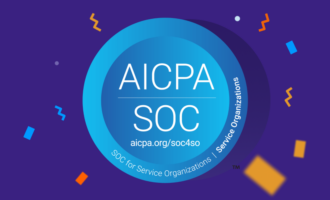

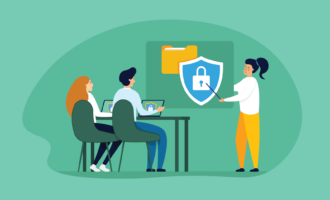
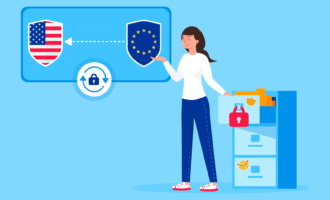



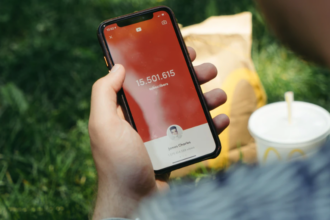

Send Comment: